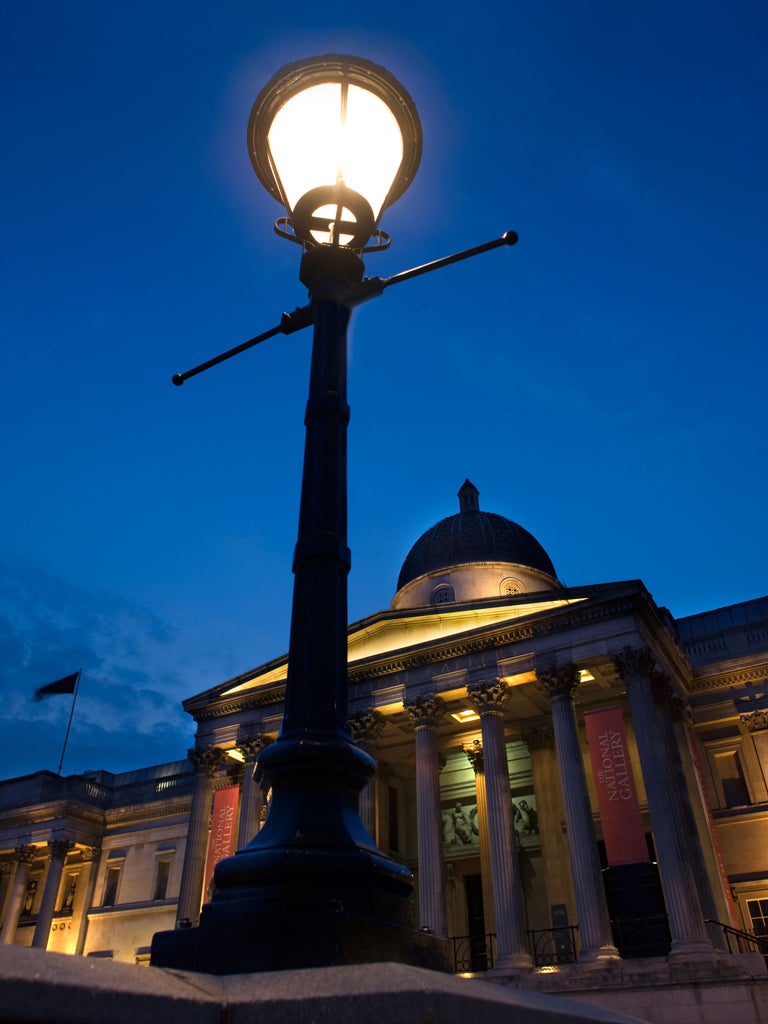David Lister: Art galleries should be like cinemas – open to audiences every night of the week
The Week in Arts


Your support helps us to tell the story
From reproductive rights to climate change to Big Tech, The Independent is on the ground when the story is developing. Whether it's investigating the financials of Elon Musk's pro-Trump PAC or producing our latest documentary, 'The A Word', which shines a light on the American women fighting for reproductive rights, we know how important it is to parse out the facts from the messaging.
At such a critical moment in US history, we need reporters on the ground. Your donation allows us to keep sending journalists to speak to both sides of the story.
The Independent is trusted by Americans across the entire political spectrum. And unlike many other quality news outlets, we choose not to lock Americans out of our reporting and analysis with paywalls. We believe quality journalism should be available to everyone, paid for by those who can afford it.
Your support makes all the difference.When Neil MacGregor was head of the National Gallery, and there were threats that public galleries might have to sell pictures, he rightly made play of the fact that the paintings there belong to the nation.
"They are not my pictures," he once said to me. "They are yours." I replied: "Thanks, in that case I'd like to come and see them next Thursday evening."
I was reminded of that conversation with the opening of the Leonardo blockbuster at the venue, and the difficulties of physically accommodating all the people who want to see the exhibition. The answer is simple, and it should be applied not just to blockbuster exhibitions. Art galleries should open at night. Every night.
Why should this be a radical suggestion? Every other art form is on at night. It would be preposterous if cinemas were showing films only in daylight hours. Why do art galleries persist in thinking that everyone can take time off work to visit in office hours?
Of course, art gallery managements will answer that they do already open at night. For Leonardo, the National Gallery is opening late on Fridays and Saturdays. Some other galleries also open late at the weekends, or for part of the weekends. But why stop there? Why should visiting a gallery, for many of us, have to be a weekend-only activity? An added irony is that many galleries, not least the National, now have excellent restaurants. You just can't have dinner there.
I had a look at the opening times for the Tate and its various outposts. Tate Modern is open late on Fridays and Saturdays. Tate Britain is open late only on Fridays. Tate Liverpool closes every day at the slightly odd time of 4.50pm. Tate St Ives closes every day at the equally odd time of 5.20pm. So, there you have it. In south-east London, they like a good Saturday night out at the art gallery; over the river at Tate Britain, they can stir themselves for a fun night out at the gallery only on Fridays. In Liverpool and St Ives, it seems they stay home every night.
I just don't believe art gallery-goers vary so much in different parts of the country or in different parts of London. Nor do I believe that lovers of international contemporary art are more adventurous on a Saturday night than lovers of British art. Art galleries should be like cinemas, theatres and opera houses. They should open at the most socially convenient hours, nationwide.
For Leonardo, the National Gallery will indeed open every night – but only in the last two weeks of the exhibition in January. So it can be done. What is stopping the National Gallery and every other big gallery from doing it all year round? If the problem is the cost of wages for warders and other staff, then why not close two mornings a week? Surely it's worth that small sacrifice for galleries to enable people to visit in the evenings, show that seeing art can be a good night out, and come into the 21st century.
Changes could be afoot at iTunes
Fresh from giving his thought-provoking John Peel lecture, urging iTunes to put some money into funding young musicians, The Who's Pete Townshend this week gave an intimate gig (and an intimate pie and mash dinner) in his boyhood locale of Shepherd's Bush to launch an excellent, remastered edition of the band's seminal album Quadrophenia. I cornered Pete to ask him if iTunes was keeping loftily silent after his well-publicised attack. Surprisingly, it seems that iTunes has, in fact, contacted him and wants to meet, so there might be good news coming for young artists. Pete also told me that iTunes informed him that it was much easier for the company to meet him now that Steve Jobs was no longer alive. Was the late Apple boss a Rolling Stones man?
The boy has got what it takes
Every week on The X Factor, one of the judges says as the ultimate accolade to a contestant: "You could be a pop star!" This week, Frankie Cocozza was axed from the show after the teenager allegedly confessed to cocaine use. He later admitted: "My life during the show has gone out of control, and my behaviour off stage has overstepped the rules of the competition."
Drugs, overstepping the rules, a life that is out of control – surely these are the basic criteria for being a pop star. Back in the day, Pete Townshend would have probably signed young Frankie up for The Who on the spot.
d.lister@independent.co.uk / twitter.com/davidlister1
Join our commenting forum
Join thought-provoking conversations, follow other Independent readers and see their replies
Comments